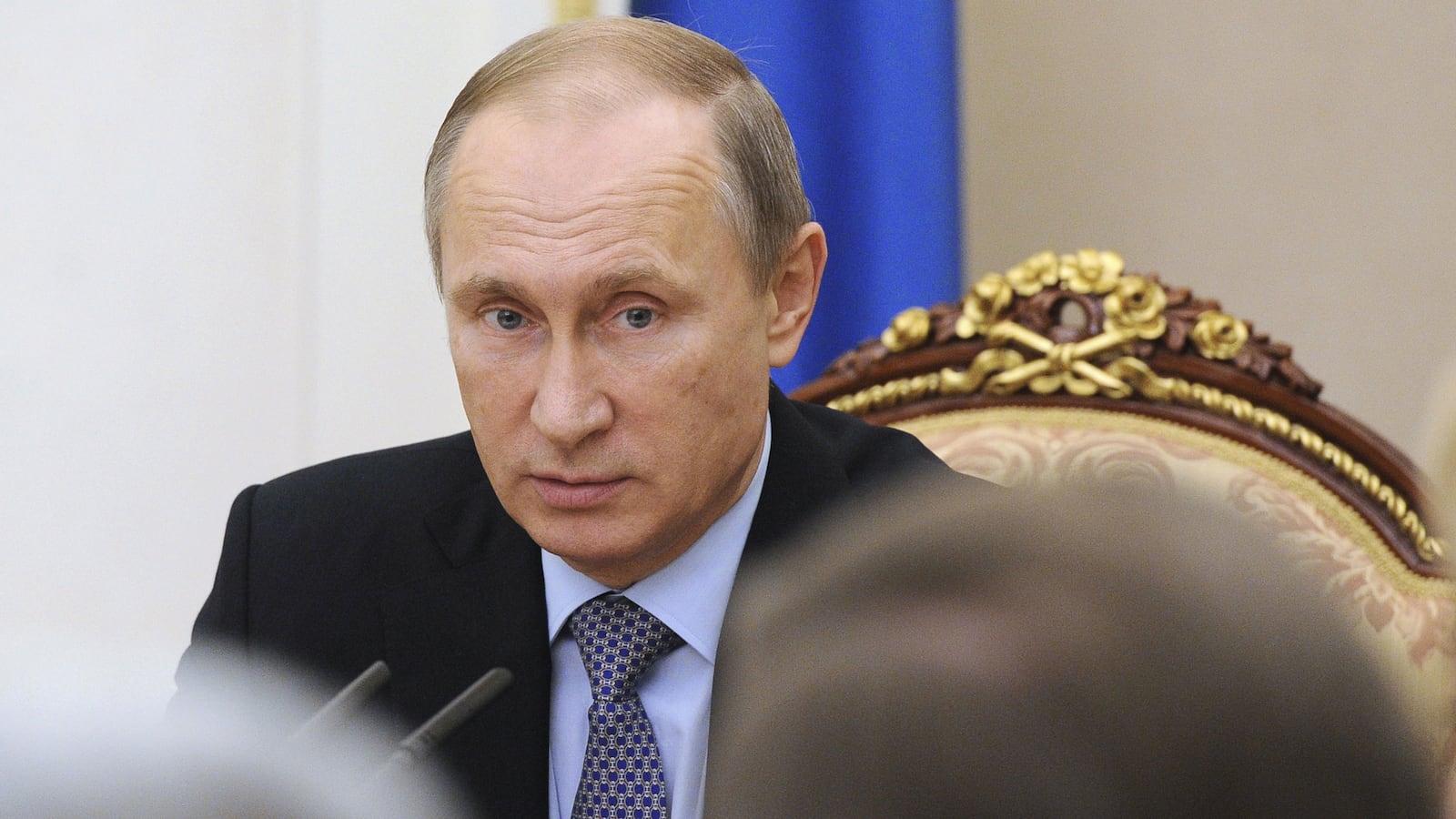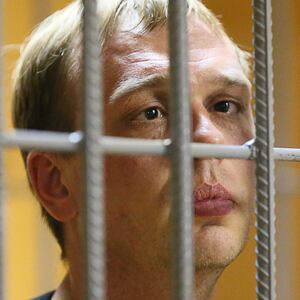MOSCOW—Crime scandals involving Russia’s most powerful law enforcement agency have rocked this capital, exposing some phenomenal corruption at the heart of President Vladimir Putin’s power structure. Ranking officers of the Federal Security Service, known as the FSB, are allegedly involved, as are members of some of its most elite units.
In April, authorities arrested three officials from the FSB’s Department K, which deals with economic crimes and financial counterintelligence. Kirill Cherkalin, the former head of the unit, and Andrey Vasilyev and Dmitry Frolov, his associates, were jailed on suspicion they took huge bribes from banks and other commerce they were supposed to supervise. A video purported to show the equivalent of $185.5 million being hauled out of Cherkalin’s residence. The initial charge against him involved a single bribe worth $850,000.
One might think those arrests made by the internal affairs division of the FSB would make other criminals in the security force lie low. But no. Others were allegedly robbing banks.
Last week RBC, one of Russia’s most respected newspapers, reported the arrests of four FSB agents from the Alfa and Vympel special forces units, and two more from Department K. The number has since grown to 15 suspects, according to press reports. But the FSB has confirmed only two arrests.
While supposedly conducting legitimate searches, or shepherding shipments of currency, the accused are supposed to have removed the heavy ballistic plates from their bullet-proof vests and stuffed them with money instead, but such details have not been confirmed officially.
There must be massive turmoil in the depths of the gloomy FSB headquarters, the nerve center of Russia’s police power located just across Lubyanka Square from the buildings of the Kremlin’s administrative offices.
All of Russia’s leading newspapers reported that Instead of providing security, FSB agents robbed the Metallurg Bank, reportedly controlled by a former officer in Military Intelligence (the GRU) named Yury Karasev. If true, that’s an interesting wrinkle since the FSB and GRU are rival secret services.
Moscovskij Komsomolets, a newspaper with a circulation approaching one million copies, says in its Friday report: “Generals of the special services were shocked to hear about the arrests of FSB agents accused of a bank robbery on Ivan Babushkin Street and of stealing 140 million rubles ($2.2 million.)”
Veteran agents of the Soviet KGB, the predecessor of the FSB, said they were disgusted by the scandal.
“This is the first time in the entire history of the Russian secret police when we see the triumph of greed that surpasses greed—so many officers of elite departments committing crimes,” retired Maj. Gen. Aleksei Kandaurov told The Daily Beast. “The FSB is not a security service any longer, it has changed its status completely: it is now a service that enforces Putin’s rule, and in exchange abuses its authority for purposes of enrichment.”
Gen. Kandaurov remembers the last days of the KGB, which had an infamous heritage dating back to the Cheka at the time of the revolution, and the NKVD under Joseph Stalin. As the Soviet Union collapsed in 1991 there was popular rage against the Communist regime’s symbols and its obsession with secrecy, but the officers of the KGB—among them one Vladimir Putin—saw themselves as defenders of a regime and indeed an empire that they had served all their lives. They worked on fixed salaries.
On the night of August, 22, 1991, Kandaurov watched from the window of his office as thousands of protesters demanded the removal of the statue of Feliks Dzerzhinsky, the Bolshevik leader Vladmir Lenin appointed to be the director of the All-Russia Extraordinary Commission to Combat Counter-revolution and Sabotage (Cheka). Dzerzhinsky is seen as the symbol of the Bolseviks’ political repressions and mass killings. “We represent in ourselves organized terror—this must be said very clearly,” Dzerzhinsky proclaimed during the period known as the Red Terror that began in 1918.
The modern state security agency, FSB, has been reviving the memory of Dzerzhinsky just as Putin has burnished the reputation of Joseph Stalin. Today many officials hang portraits of the secret police founder on their walls. In 2017 the agency celebrated the 100th anniversary of Cheka-NKVD-KGB-FSB, as a proud successor. But veterans see the current organization as an inglorious pretender to the fame of the older ones.
“FSB agents should stop hiding behind the KGB reputation, behind Dzerzhinsky. If he were alive, he would have executed most of these corrupt officers as his ideological enemies,” Kandaurov told The Daily Beast.
Russia has glorified “Alfa” and “Vympel” as legendary, heroic special operators who saw service in the Soviet occupation of Afghanistan during the 1980s and many other more secretive theaters. At the Balashikha Cemetery near Moscow there are sad rows of tombstones where each is marked with an “A” or “V” for the soldiers of these units who gave their lives rescuing hostages during the Beslan school siege in September 2004.
In the past few years Russian special operators have died anonymously in secret operations in Ukraine.
“Today’s thugs in the special forces put shame on all the past heroes,” a retired KGB officer and corruption fighter, Gennady Gudkov, told The Daily Beast. “The FSB violates its authority for ‘operative activities,’ which was given to them to stop transactions for terrorism or drug deals. Now a group of elite FSB and special forces units used their authority to rob a bank; but the bank informed Moscow police investigators and the organized criminal group was arrested.”
A channel on the Telegram messaging service covering the latest news about Russian gangsters, oligarchs and bureaucrats, said on Monday that authorities fired the head of Moscow’s FSB Directorate, Alexey Dorofeyev.
Last month police tried to stop an investigation by a Medusa Project reporter, Ivan Golunov, into Dorofeyev’s links to a corrupt funeral business. After spending months researching figures and beneficiaries of the funeral industry, Golunov discovered some links connecting shadowy figures and senior FSB officers. But somebody decided to stop the reporter from publishing: police planted drugs on Golunov and kept him behind bars for five days, while thousands of people joined protests in support of the journalist.
Russian veterans of secret services gossip about three “towers” of FSB power: the richest one is allegedly supported by the almighty Putin’s ally, Igor Sechin, the head of the vast Rosneft energy company; the second one also enjoys enormous financial resources and is backed by another of Putin’s long-time friends, Sergey Chemizov, the head of the Russian arms export agency; the third, the weakest financially, nonetheless has the best network of secret agents and is backed by the head of the Foreign Intelligence Service (SVR), Sergey Naryshkin. Some see a connection between these rivalries and the revelations about high-level criminality.
“It feels like everything is falling down,” a major general of the FSB reserve, Alexander Mikhailov, told reporters last week. “I want to tell you that all the old employees are shocked by what is happening. During my entire service in the Moscow KGB, and I worked there for 20 years, there were only three criminal cases.”
“None of the people from the old guard understands where that number of criminals in the system came from,” said Mikhailov. “It is also disturbing that today we are confronted with the widest range of units that are involved in criminal activity. We repair it in one spot and it breaks down in another one.”
There are no checks and balances at FSB management, Gudkov pointed out. “The Soviet KGB was massively repressive, you can blame that service for anything, but not for corruption. The worst we could hear about was a colleague sleeping with somebody’s wife or some secret agent bringing a pair of sneakers for a colleague from abroad—that was already a big enough scandal to write a report,” Gudkov remembered. “Even in our worst nightmare we could not imagine officers stealing millions of dollars, robbing banks. What will we hear next? The Russian Federal Security Service robbing the Kremlin’s treasury or the Central Bank’s reserves?”








